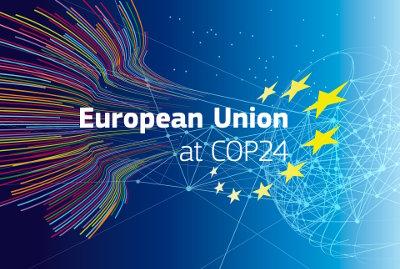
This year's UN climate conference will be a key moment for implementation of the Paris Agreement, with Parties aiming to finalise detailed rules and guidelines - the Paris ‘work programme' - that will enable the landmark accord to be put into practice across the world.
A robust and operational work programme consistent with what was agreed in Paris in 2015 will be crucial to enable all Parties to implement, track and progressively enhance their contributions, in order to help meet the Agreement’s long-term goals.
Commissioner for Climate Action and Energy Miguel Arias Cañete said: “This is a crucial moment for following through on the historic commitments of three years ago. We now need political will and courage to finalise a Paris work programme that will allow all countries to make the transition to a truly low-carbon, climate-resilient future. The EU is showing leadership: just last week, the Commission presented a strategic vision for a climate-neutral economy by 2050.”
The 24th Conference of the Parties to the UN Framework Convention on Climate Change (UNFCCC) – ‘COP24’ – is taking place from 2-14 December in Katowice, Poland, presided over by the Polish government. It brings together ministers and government officials, as well as a wide range of stakeholder representatives.
Three years after the Paris Agreement was adopted, the EU hopes that all Parties in Katowice will show the commitment and determination necessary to secure an ambitious, comprehensive and tailored work programme covering all key areas including transparency, finance, mitigation and adaptation. This will enable and encourage climate action at all levels worldwide and demonstrate the global commitment to ambition.
COP24 will also feature the political phase of the ‘Talanoa Dialogue’ – an international process to take stock of the collective and individual efforts towards the Paris Agreement goals. The outcomes of this political phase, which follows a comprehensive technical phase throughout 2018, should be a commitment by all Parties to reflect on their ambition level and a strong message to the world in support of Paris and its long-term goals, to spur momentum for action.
The Talanoa political phase is also an opportunity for Parties to exchange views on how to promote further action, namely in the context of the recent Intergovernmental Panel on Climate Change (IPCC) special report on global warming of 1.5°C.
EU action
The EU’s NDC is to reduce greenhouse gas (GHG) emissions by at least 40% by 2030 compared to 1990, under its wider 2030 climate and energy framework. All key legislation for implementing the 2030 emissions target has already been adopted, including a modernisation of the EU Emissions Trading System (EU ETS) post-2020 and new 2030 targets for all Member States to cut emissions in non-ETS sectors including transport, buildings, agriculture and waste.
EU decision-makers have also increased the EU’s 2030 targets on renewable energy and energy efficiency – which if fully implemented could lead to an EU GHG emissions cut of some 45% by 2030, the Commission has estimated.
Yet EU ambition goes beyond 2030. Following requests by EU leaders and the European Parliament, the Commission last week presented a strategic vision for a long-term strategy to reduce GHG emissions and make the EU climate-neutral.
The strategic vision, which follows wide stakeholder consultation and takes into account the recent IPCC special report on 1.5°C, is an ambitious vision for ensuring a prosperous, modern, competitive and secure economy, providing sustainable growth and jobs and improving the quality of life of EU citizens.
The strategic vision, which the Commission will present to our global partners at COP24, will kickstart an EU-wide debate which should allow the EU to adopt a long-term strategy and submit it to the UNFCCC by 2020.
The EU also remains committed to the collective global goal to mobilise USD 100 billion a year by 2020 and through to 2025 to finance climate action in developing countries, from a variety of public and private sources. In 2017, the EU, its Member States and the European Investment Bank together provided a total EUR 20.4 billion in climate finance, around a 50% increase from 2012.
Alongside the formal UNFCCC negotiations, the Katowice conference will showcase climate action by a wide range of stakeholders, including cities, regions, businesses, academic and civil society groups. The EU is a strong supporter of the Global Climate Action Agenda (GCAA), an important platform for multi-stakeholder action, and will continue to engage actively in this forum.
The EU will be represented in the negotiations by Miguel Arias Cañete, Commissioner for Climate Action and Energy, and Elisabeth Köstinger, Minister for Sustainability and Tourism of Austria, which currently holds the EU Council Presidency.
EU side events at COP24
During the conference, the EU will host over 100 side events at the EU Pavilion in Katowice. These events, organised by a variety of countries and organisations from Europe and around the world, will address a broad range of climate-related issues, such as the energy transition, finance and research and innovation.
EU press briefings at COP24
The EU delegation will hold regular press briefings during COP24, which will be streamed live and 'on demand'.
Read more:
Details
- Publication date
- 3 December 2018
- Author
- Directorate-General for Climate Action
